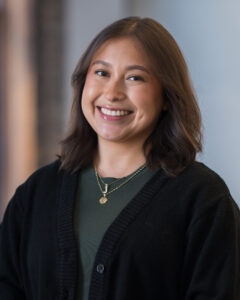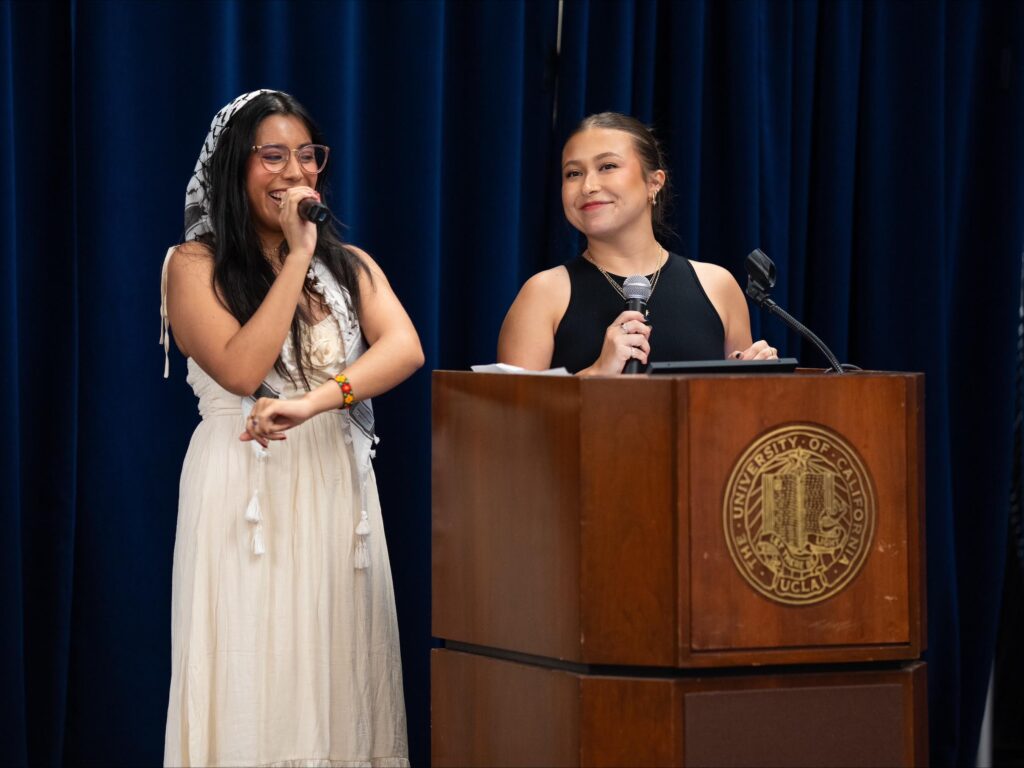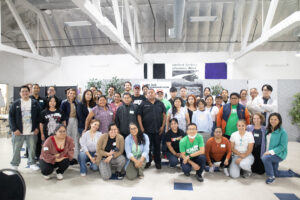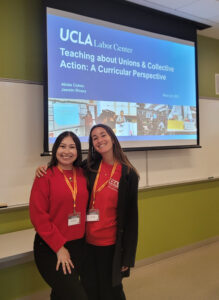
We spoke to Jazmin Rivera, Community Education Specialist for the UCLA Labor Center, about the importance of research justice.
Jazmin Rivera, Community Education Specialist at the UCLA Labor Center, sat down to speak on the importance of involving youth in community engagement efforts. Jazmin was first introduced to worker justice, as well as leaders in the labor movement, during her time as an undergraduate in UCLA’s labor studies program. Her time as an Astin Community Engaged Scholar further opened up her horizons of what community-engaged research looks like and was instrumental to the work she does today.
What sparked your interest in workers’ rights?
My interest began when I was a student worker at UCLA, and I was really struggling. I didn’t even know I had rights. Especially as a student worker, you feel like you’re not so much of a student, or so much of a worker. You’re in this weird in-between.
It just so happened that I took an elective that was a labor studies class, and that just opened up my brain. I realized I was experiencing workplace violations — working on my feet without breaks, wage theft — and so that really started my journey. I became a labor studies major and just like that, my life changed.

You graduated from UCLA with a double major in labor studies and political science, and then you also minored in Chicana & Chicano studies. How did your coursework impact you and your passion for the labor movement?
Being a labor studies student exposed me to so many amazing organizers and people in this movement. The first class I took in labor studies with professor Janna Shadduck-Hernández was life-changing, not just because it introduced me to the labor movement, but because I ended up getting my first full-time job through my relationship with Janna. I credit a lot to labor studies for exposing me to organizations that I didn’t know existed. My political science and Chicano studies background, I still lean on a lot, especially when it comes to policy and the political world I navigate right now in my job. I feel really fortunate to have gotten this education.
Can you tell me about the Astin Community Engaged Scholars Program and how your experience was interning for AFSCME 3299?
Being an Astin scholar was one of the most impactful experiences I had as an undergrad, because I was exposed to community-engaged research. Prior to that, I thought research was a very solitary, sterile, extractive line of work, like it was all numbers and research labs.
Being an Astin scholar, I experienced what it’s like to learn from and research with other people and the community. We would have three-hour-long collective conversations as a class. And that was a form of research, what we were doing together — talking with each other, challenging each other’s thoughts, asking each other for clarifications.
It was so awesome to be in that type of environment and to learn in community with others, especially with the topic that we were researching: the impacts of decarceration as it relates to work. I look back at that, and I just feel so grateful to have gotten that experience. Here at the UCLA Labor Center, our whole framework is research justice, and now I understand that research is so much more than just numbers. It’s so much more than just extracting from communities. Research is done alongside others.

How can someone get more involved in community engagement efforts?
There are so many, so many ways to get involved. Honestly, step one is to just talk to your coworkers. Have that conversation of, “Hey, what do you think about working here?” We learn so much from talking with people.
And then, of course, there’s always an action. If folks want to get involved with reaching young people and talking to them about their labor rights, there are opportunities to volunteer with the Young Workers Education Project. And that’s the mode in which the UCLA Labor Center is able to interact with and reach so many young people and students. We are constantly looking for volunteers and coaches for the collective bargaining simulation, especially if you work at a union workplace, or you come from a union background.
You can also be vocal and show your support for workers who are organizing on the ground, every day. Right now in LA, we’re really looking at our tourism workers — our folks at the airport, our folks at Unite Here Local 11. There’s also a big fight in the Inland Empire with Amazon. There are Starbucks stores around the nation that are unionizing and organizing. There are so many ways to get involved right now in the labor movement, and you don’t have to be an expert. You don’t have to come with any sort of background, you don’t even have to know what a union is! There’s always going to be someone to help you learn about how to show solidarity along the way.


